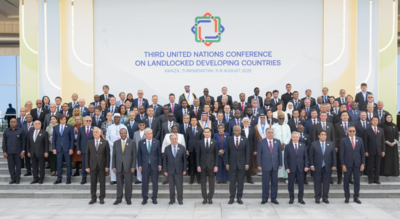The Third United Nations Conference on Landlocked Developing Countries (LLDC3) opened in Awaza, Turkmenistan, on 5 August 2025, convening world leaders, international policymakers, and key stakeholders to chart a path forward for 32 landlocked nations. The conference, themed “Driving Progress through Partnerships,” serves as a crucial platform to address structural challenges, mobilize investment, and implement the newly adopted Awaza Programme of Action (2024–2034).
UAE’s role and participation
The United Arab Emirates participated in LLDC3 through a high-level delegation led by Suhail bin Mohammed Faraj Al Mazrouei, Minister of Energy and Infrastructure and Special Envoy of the Minister of Foreign Affairs to Turkmenistan. Al Mazrouei emphasized that the UAE’s presence aligns with its long-standing strategy of supporting global development and advancing multilateral cooperation. He highlighted the UAE’s commitment to promoting sustainable development, enhancing regional economic integration, and investing in advanced infrastructure to help landlocked developing countries (LLDCs) overcome geographical constraints. Expressing optimism about the conference outcomes, Al Mazrouei underscored the importance of building effective partnerships, exchanging expertise, and unlocking new opportunities for shared growth and investment. During the conference, the UAE delegation also held bilateral meetings with key figures, including Rashid Meredov, Deputy Chairman of the Cabinet of Ministers and Minister of Foreign Affairs of Turkmenistan, and Abdulkadir Uraloğlu, Minister of Transport and Infrastructure of Türkiye. These discussions focused on expanding cooperation in energy, transportation, and infrastructure. The UAE delegation included Ahmed Al Hameli, UAE Ambassador to Turkmenistan, and officials from both the Ministry of Foreign Affairs and the Ministry of Energy and Infrastructure.
A critical gathering for the world’s LLDCs
The LLDC3 conference, held once every ten years, brings global attention to the 32 landlocked developing countries, which collectively house over 600 million people. Due to their lack of direct access to seaports, these countries face disproportionate barriers to trade, economic diversification, and infrastructure development. The primary objective of LLDC3 is to facilitate coordinated international efforts to bridge these development gaps. Over four days, the conference will explore actionable solutions through partnerships, smarter investment frameworks, and the development of efficient, flexible transport corridors that enhance the movement of goods and services across regions.
The Awaza Programme of Action (2024–2034)
A central focus of LLDC3 is the implementation of the Awaza Programme of Action (APoA) for the Decade 2024–2034. The APoA was adopted by consensus at the UN General Assembly on 24 December 2024 and offers a comprehensive framework to tackle persistent development challenges faced by LLDCs. Built on five interconnected priority areas, the programme aims to support:
- Structural Transformation, and Science, Technology, and Innovation
- Trade, Trade Facilitation, and Regional Integration
- Transit, Transport, and Connectivity
- Enhancing Adaptive Capacity, Strengthening Resilience, and Reducing Vulnerability
- Implementation, Follow-up, and Monitoring
The APoA outlines a number of significant international initiatives and deliverables:
- Establishment of Regional Agricultural Research Hubs to bolster food security.
- Launch of an Infrastructure Investment Finance Facility to unlock essential funding for large-scale projects.
- Formation of the UN Secretary-General’s High-Level Panel on Freedom of Transit, aimed at promoting seamless cross-border movement.
- Execution of a dedicated WTO Work Programme to prioritize LLDC concerns in global trade policies.
- Development of a UNFCCC Negotiating Body focused on trade and climate resilience for LLDCs.
LLDC3 marks a pivotal point for the global community to reaffirm its commitment to inclusive and sustainable development. As host country Turkmenistan plays a key diplomatic role, the conference is set to define the direction of development cooperation with LLDCs through 2034.







